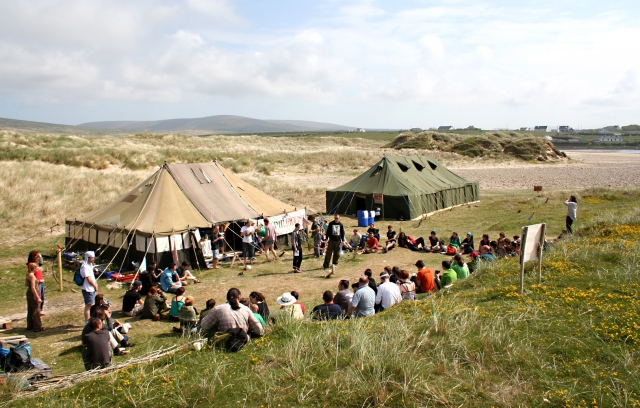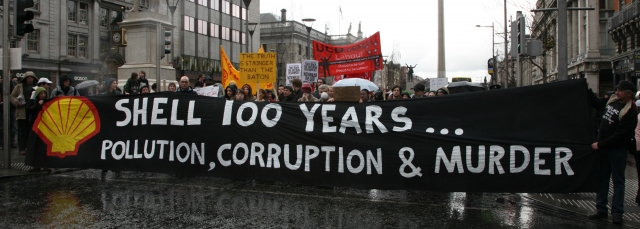From the Open-Publishing Calendar
From the Open-Publishing Newswire
Indybay Feature
Welcome to Rossport, Ireland. Population: Pipeline
In June of 2005, in a village called Rossport in Northwest Ireland, residents began to notice an unusual number of trucks carrying pipeline on their roads. There were so many trucks, in fact, that it was sometimes impossible to travel anywhere as these giant lorries could fully eclipse the narrow country lanes.
The meaning of this convoy was a plan by the infamous Shell Corporation to construct a massive, $1.1 billion, high-pressure pipeline and gas refinery, cutting through farms and villages, and ruining the obligatory protected natural areas.
Thus, the “Shell to Sea” campaign was conceived by locals and drew activists from around Ireland and the UK in support, because, in the words of spokesperson Mark Garavan, “of the certainty that if this pipeline as currently proposed ruptures we—our families and neighbors—will die.”
The idea is that if Shell simply builds its precious pipeline in the ocean, then the chances of accidental explosions and negative health effects are reduced, and everyone is happy. More militant protesters, however, have adopted the less merciful slogan of “Shell to Hell,” suggesting that instead of assembling the pipeline in the sea, the corporation should just ‘feck’ off entirely. The Irish Sea (albeit on the east side of the island) is already one of the most radioactive bodies of water in the world, thanks to nuclear power plants in Great Britain. The added toxins from the Shell pipeline might soon guarantee all of Ireland to no longer be afloat in a pool of water, but rather, one of profitable pollution.
In the early days of the Rossport Solidarity Camp, five men—including a 65-year-old former schoolteacher—were imprisoned for denying Shell access to their land. They were incarcerated for over three months. Today, activists continue to be beaten and arrested. But with a highly functional 24-hour camp, with all the necessary structures for daily living including a kitchen, composting toilet, and grey-water system, evicting the protesters has proven exceedingly difficult. And as long as picketers remain present, Shell cannot move forward with its aforementioned plan to tear up County Mayo, Ireland.
The Rossport story is a familiar one. It is especially familiar in the Dutch Antilles, South Africa, Brazil, the Philippines, Nigeria, and other unfortunate targets for Shell activity. We all remember the execution of Ken Saro-Wiwa and his eight Ogoni colleagues in 1995 for campaigning against oil companies in the Niger Delta. And history is threatening to repeat itself as the metaphorical gas flares of protest are heating up in the Irish countryside.
The Irish are in a unique position: for all of modern history they have existed in poverty and oppression, most memorably noted for the Potato Famine and British colonialism. Only in the past 20 years has the island begun to experience significant wealth. In one generation, Ireland has gone from dirt-poor to boasting the second-highest GDP in the European Union. But among the rich, there is still a large cache of poor—that’s the big secret.
Foreign investors argue that the Corrib gas field project is a highly efficacious tool for swelling the gross national product. Yet it is obvious that the plan is only profitable to some (particularly the Netherlands-based Shell and Statoil, their Norwegian minority partner), making it unpopular among most locals, especially after the arrest of the Rossport Five.
“We’re not dispassionate corporate people who don’t give a damn about five poor people in prison—that’s not the case,” Andy Pyle, the head of Shell’s Irish operations said. “But we can’t satisfy everybody. If this has to be designed in a way that everybody accepts it, it will never be built.”
This past November, the Rossport Solidarity Camp was “infiltrated” by a reporter from Mail on Sunday who, in his article “Guerilla War Threat by Shell Protesters,” drew parallels between the Shell to Sea campaign, the SHAC actions at Huntingdon Life Sciences, and the IRA, effectively branding these picketers as “terrorists.”
Apparently Warren Swords, the undercover journalist, did some good persuasive writing, as it was around this time that the Gardai (police) violence jumped from unnecessary and annoying, to downright life-threatening—with tactics such as baton-charging, throwing a protestor over a fence into a deep ditch, and even savagely beating one man in front of a dozen witnesses. Some began mysteriously blaming the violence on Sinn Fein, the Irish Republican party.
Swords’ article is not the only example of intimidation being applied in a distorted media. Clearly someone is trying to up the ante because frankly, those pesky protesters aren’t really going anywhere.
On February 16, 2007, 120 protestors occupied Shell’s Gas Terminal construction site in Bellanaboy, Ireland, until they were forcibly removed by roughly 150 police. On the same day, activists in Edinburgh, Scotland shut down eight Shell petrol stations around the city center by pulling the emergency shut-off levers. In addition, thousands marched on O’Connell Street in Dublin, all in solidarity with the Shell to Sea campaign in Rossport.
In time for Christmas last year, Willie Corduff, Vincent and Philip McGrath, Micheál Ó Seighin, and Brendan Philbin released a book of their experiences in prison called Our Story—the Rossport Five. Vincent McGrath said the book was an “opportunity to talk directly to the Irish people, bypassing the mainstream media [because] there has been hysterical coverage in some of the mainstream media…[our story] could be about lots of communities in Ireland who feel betrayed by the political parties; who’ve had projects imposed on them.”
Whether he knows it or not, those sentiments could be extended far beyond Irish borders. We find here a disturbing revisiting of colonialism; only this time the colonizer comes wearing a different hat.
From Fault Lines #20
Thus, the “Shell to Sea” campaign was conceived by locals and drew activists from around Ireland and the UK in support, because, in the words of spokesperson Mark Garavan, “of the certainty that if this pipeline as currently proposed ruptures we—our families and neighbors—will die.”
The idea is that if Shell simply builds its precious pipeline in the ocean, then the chances of accidental explosions and negative health effects are reduced, and everyone is happy. More militant protesters, however, have adopted the less merciful slogan of “Shell to Hell,” suggesting that instead of assembling the pipeline in the sea, the corporation should just ‘feck’ off entirely. The Irish Sea (albeit on the east side of the island) is already one of the most radioactive bodies of water in the world, thanks to nuclear power plants in Great Britain. The added toxins from the Shell pipeline might soon guarantee all of Ireland to no longer be afloat in a pool of water, but rather, one of profitable pollution.
In the early days of the Rossport Solidarity Camp, five men—including a 65-year-old former schoolteacher—were imprisoned for denying Shell access to their land. They were incarcerated for over three months. Today, activists continue to be beaten and arrested. But with a highly functional 24-hour camp, with all the necessary structures for daily living including a kitchen, composting toilet, and grey-water system, evicting the protesters has proven exceedingly difficult. And as long as picketers remain present, Shell cannot move forward with its aforementioned plan to tear up County Mayo, Ireland.
The Rossport story is a familiar one. It is especially familiar in the Dutch Antilles, South Africa, Brazil, the Philippines, Nigeria, and other unfortunate targets for Shell activity. We all remember the execution of Ken Saro-Wiwa and his eight Ogoni colleagues in 1995 for campaigning against oil companies in the Niger Delta. And history is threatening to repeat itself as the metaphorical gas flares of protest are heating up in the Irish countryside.
The Irish are in a unique position: for all of modern history they have existed in poverty and oppression, most memorably noted for the Potato Famine and British colonialism. Only in the past 20 years has the island begun to experience significant wealth. In one generation, Ireland has gone from dirt-poor to boasting the second-highest GDP in the European Union. But among the rich, there is still a large cache of poor—that’s the big secret.
Foreign investors argue that the Corrib gas field project is a highly efficacious tool for swelling the gross national product. Yet it is obvious that the plan is only profitable to some (particularly the Netherlands-based Shell and Statoil, their Norwegian minority partner), making it unpopular among most locals, especially after the arrest of the Rossport Five.
“We’re not dispassionate corporate people who don’t give a damn about five poor people in prison—that’s not the case,” Andy Pyle, the head of Shell’s Irish operations said. “But we can’t satisfy everybody. If this has to be designed in a way that everybody accepts it, it will never be built.”
This past November, the Rossport Solidarity Camp was “infiltrated” by a reporter from Mail on Sunday who, in his article “Guerilla War Threat by Shell Protesters,” drew parallels between the Shell to Sea campaign, the SHAC actions at Huntingdon Life Sciences, and the IRA, effectively branding these picketers as “terrorists.”
Apparently Warren Swords, the undercover journalist, did some good persuasive writing, as it was around this time that the Gardai (police) violence jumped from unnecessary and annoying, to downright life-threatening—with tactics such as baton-charging, throwing a protestor over a fence into a deep ditch, and even savagely beating one man in front of a dozen witnesses. Some began mysteriously blaming the violence on Sinn Fein, the Irish Republican party.
Swords’ article is not the only example of intimidation being applied in a distorted media. Clearly someone is trying to up the ante because frankly, those pesky protesters aren’t really going anywhere.
On February 16, 2007, 120 protestors occupied Shell’s Gas Terminal construction site in Bellanaboy, Ireland, until they were forcibly removed by roughly 150 police. On the same day, activists in Edinburgh, Scotland shut down eight Shell petrol stations around the city center by pulling the emergency shut-off levers. In addition, thousands marched on O’Connell Street in Dublin, all in solidarity with the Shell to Sea campaign in Rossport.
In time for Christmas last year, Willie Corduff, Vincent and Philip McGrath, Micheál Ó Seighin, and Brendan Philbin released a book of their experiences in prison called Our Story—the Rossport Five. Vincent McGrath said the book was an “opportunity to talk directly to the Irish people, bypassing the mainstream media [because] there has been hysterical coverage in some of the mainstream media…[our story] could be about lots of communities in Ireland who feel betrayed by the political parties; who’ve had projects imposed on them.”
Whether he knows it or not, those sentiments could be extended far beyond Irish borders. We find here a disturbing revisiting of colonialism; only this time the colonizer comes wearing a different hat.
From Fault Lines #20
For more information:
http://struggle.ws/rsc
Add Your Comments
We are 100% volunteer and depend on your participation to sustain our efforts!
Get Involved
If you'd like to help with maintaining or developing the website, contact us.
Publish
Publish your stories and upcoming events on Indybay.
Topics
More
Search Indybay's Archives
Advanced Search
►
▼
IMC Network





